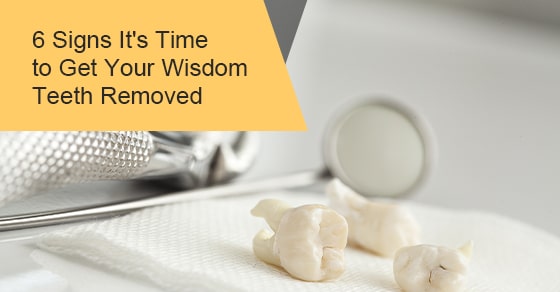
Wisdom teeth don’t make you any wiser, in fact they have quite the opposite effect by causing more pain than gain. So why do we have them? Researchers believe that they were an evolutionary answer to the need for us to eat raw meat, veggies and roots.
Wisdom teeth are late-stage molars that erupt from the gums after your permanent teeth have already grown in. They can cause extreme pain and discomfort and they can cause crowding with your existing teeth.
This third set of molars can grow in at the ages of 17 and 21, which are known as the wisdom years. Wisdom teeth are not always functional, in fact most of the time they simply cause problems and need to be removed.
If wisdom teeth are not removed they can contribute to problems like overcrowding, crooked teeth, jaw alignment, sinus problems, long-term, damaging cavities and cysts. Still, some lucky individuals don’t actually experience any of this pain and discomfort and so the question becomes should they have them removed? Or, just because wisdom teeth removal is standard practice, do all wisdom teeth need to be removed?
Here are 6 common signs that you might need to get your wisdom teeth removed:
If you experience pain while you are eating, brushing your teeth or doing nothing at all, this can be a sign that you need your wisdom teeth removed. If you have pain, sensitivity or any slight throbbing sensation then you should schedule an appointment with your dentist to have them checked out. Any pain associated with your teeth should not be ignored, and it can usually be fixed quickly and easily if caught early on.
If the pain is left untreated, it can progress into something much more serious and need a more complicated treatment. One common example is a cavity that can be fixed with a simple filling, compared to one that was left untreated and now needs a whole new crown, or even a root canal. With wisdom teeth, the first signs of pain can turn into severe pain resulting in infection.
Since you already have your permanent teeth when your wisdom teeth start coming through, this forces them to shift their position. This shifting can lead to pain, bite problems and overcrowding, making your daily routine of flossing or brushing harder and less effective.
This will eventually lead to cavities or tooth decay. If it goes untreated you might need to undergo additional procedures to help straighten out any impacted neighbouring teeth.
In addition, some individuals start to feel their jaw stiffen with pain as their jawbone becomes damaged, thus negatively impacting the mouth’s function and motion. In some cases, wisdom teeth will grow impacted within the jaw if there is no room for them to erupt through the gums.
This can even result in a shift in your jawline. This will limit the movement of your mouth, causing pain when you open or close. Cysts can also start forming along newly erupted wisdom teeth, which can hollow out your jaw bone, damaging the nerves of healthy teeth if left untreated.
Your mouth and nose are intricately connected so any major issues that are happening in your mouth can also have a negative impact on your sinuses. Wisdom teeth removal is recommended when they start to cause sinus pain, congestion and pressure as they start to come through. Oral health is a key part of staying healthy overall, so this is why it is extremely important to pay attention to any symptoms.
Wisdom teeth grow in pretty gradually and may only be noticed when the patient feels pain and impaction. You should not ignore any toothache or sensitivity when it comes to your teeth or even any slight throbbing sensations. Always pay attention to where the pain occurs. If it happens on contact at the back of your mouth when eating or brushing, then that probably means your wisdom teeth are starting to erupt. It won’t take long for them to start growing out at an angle that will impact your jaw or displace other teeth.
Your oral health doesn’t just include your teeth, it includes your gums as well. Gums play a huge role and they can also suffer from impacted wisdom teeth. When wisdom teeth grow in at an odd angle and impact other teeth they cause the gums to swell up which makes it difficult to brush properly.
The red or dark pink areas along the gum line will typically feel sensitive and sore to the touch. This prevents you from flossing or brushing properly, and this will eventually lead to cavities and tooth decay.
When your gums are swollen around impacted or misaligned wisdom teeth and they become more difficult to clean, more and more food and bacteria get trapped there and start to create plaque. This plaque can then lead to infection and the resulting bacteria releases sulphur compounds which create extremely bad-smelling breath or an unpleasant taste in your mouth.
Getting your wisdom teeth removed is a very common dental procedure. We encourage you to have your wisdom teeth checked out before you start to feel any of the above symptoms.
For more information about wisdom teeth removal or family dentistry in Oakville, call Oakville Place Dental at 905-842-6030 or contact us here.
 0 Comment
0 Comment